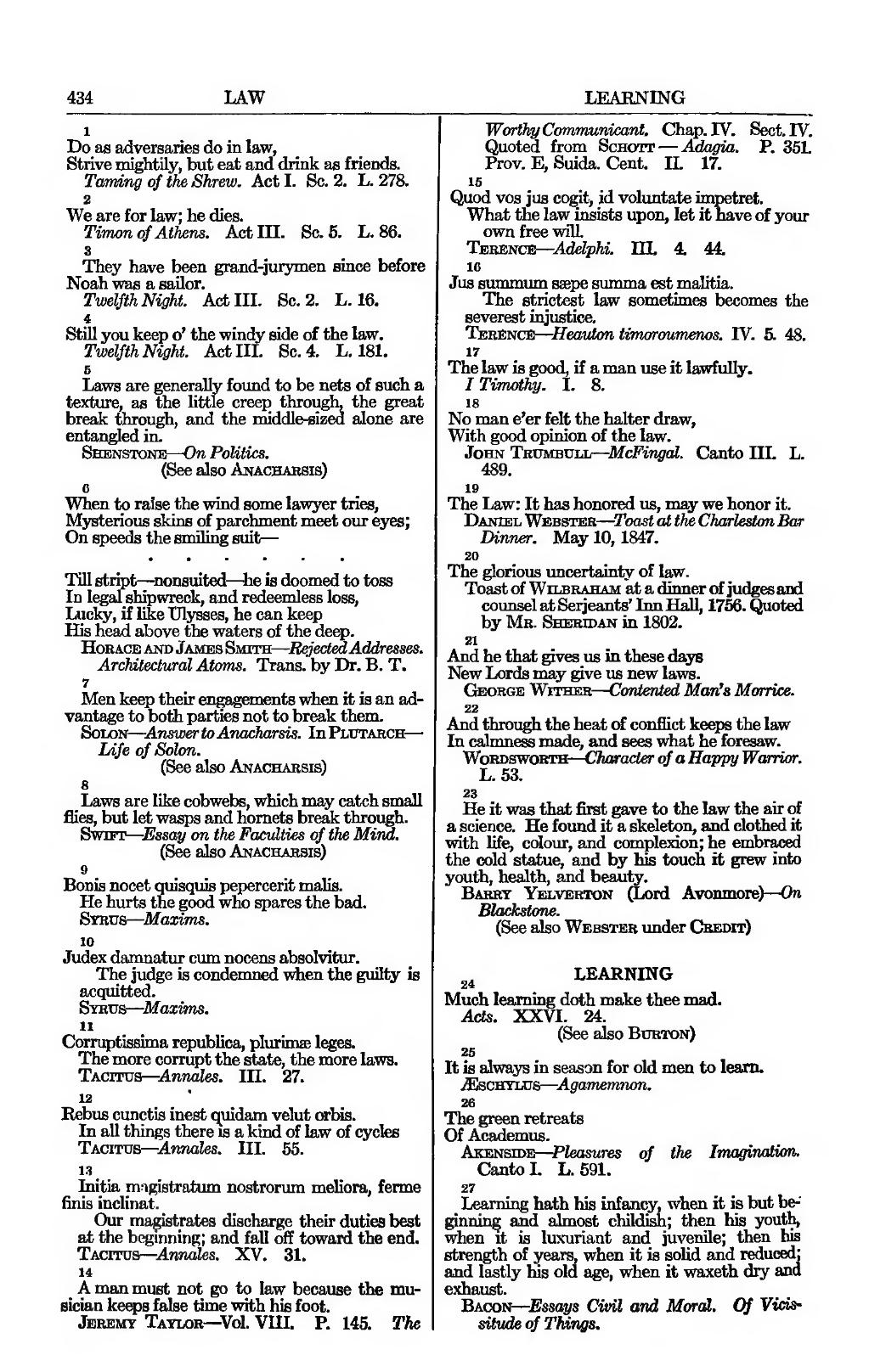Do as adversaries do in law,
Strive mightily, but eat and drink as friends.
We are for law; he dies.
Timon of Athens. Act III. Sc. 5. L. 86.
They have been grand-jurymen since before
Noah was a sailor.
Twelfth Night. Act III. Sc. 2. L. 16.
Still you keep o' the windy side of the law.
Twelfth Night. Act III. Sc. 4. L. 181.
Laws are generally found to be nets of such a
texture, as the little creep through, the great
break through, and the middle-sized alone are
entangled in.
Shenstonb—On Politics.
| seealso = (See also Anacharsis)
| topic =
| page = 434
}}
{{Hoyt quote
| num = 6
| text = <poem>When to raise the wind some lawyer tries,
Mysterious skins of parchment meet our eyes;
On speeds the smiling suit—
Till stript—nonsuited—he is doomed to toss
In legal shipwreck, and redeemless loss,
Lucky, if like Ulysses, he can keep
His head above the waters of the deep.
Horace and James Smith—Rejected Addresses.
Architectural Atoms. Trans, by Dr. B. T.
Men keep their engagements when it is an advantage to both parties not to break them.
Solon—Answer to Anacharsis. In Plutarch—
Life of Solon.
| seealso = (See also Anacharsis)
{{Hoyt quote
| num = 8
| text = Laws are like cobwebs, which may catch small
flies, but let wasps and hornets break through.
Swdt—Essay on the Faculties of the Mind.
| seealso = (See also Anacharsis)
| topic =
| page = 434
}}
{{Hoyt quote
| num = 9
| text = <poem>Bonis nocet quisquis pepercerit malis.
He hurts the good who spares the bad.
Syrus—Maxims.
Judex damnatur cum nocens absolvitur.
The judge is condemned when the guilty is
acquitted.
Syrus—Maxims.
Corruptissima republica, plurimffi leges.
The more corrupt the state, the more laws.
Tacitus—Annates. III. 27.
Rebus cunctis inest quidam velut orbis.
In all things there is a kind of law of cycles
Tacitus—Annates. III. 55.
l.i
Initia migistratum nostrorum meliora, ferme
finis inclinat.
Our magistrates discharge their duties best
at the beginning; and fall off toward the end.
Tacitus—Annates. XV. 31.
A man must not go to law because the musician keeps false time with his foot.
Jeremy Taylor—Vol. VIII. P. 145. The
Worthy Communicant. Chap. IV. Sect. IV.
Quoted from Schott—Adagia. P. 351.
Prov. E, Suida. Cent. II. 17.
Quod vos jus cogit, id voluntate impetret.
What the law insists upon, let it have of your
own free will
Terence—Adelphi. HL 4. 44.
Jus summum ssepe summa est malitia.
The strictest law sometimes becomes the
severest injustice.
Terence—Heauton timoroumenos. IV. 5. 48.
The law is good, if a man use it lawfully.
J Timothy. I. 8.
No man e'er felt the halter draw,
With good opinion of the law.
John Trumbull—McFingal. Canto III. L.
489.
The Law: It has honored us, may we honor it.
Daniel Webster—Toast at the Charleston Bar
Dinner. May 10, 1847.
The glorious uncertainty of law.
Toast of Wilbraham at a dinner of judges and
counsel at Serjeants' Inn Hall, 1756. Quoted
by Mr. Sheridan in 1802.
And he that gives us in these days
New Lords may give us new laws.
George Wither—Contented Man's Mortice.
And through the heat of conflict keeps the law
In calmness made, and sees what he foresaw.
Wordsworth—Character of a Happy Warrior.
L. 53.
He it was that first gave to the law the air of
a science. He found it a skeleton, and clothed it
with life, colour, and complexion; he embraced
the cold statue, and by his touch it grew into
youth, health, and beauty.
Barry Yelverton
| cog = (Lord Avonmore)
| work = On
Blackstone.
| seealso = (See also Webster under Credit)
| topic =
| page = 434
}}
LEARNING
{{Hoyt quote
| num =
| text = Much learning doth make thee mad.
Acts. XXVI. 24.
| seealso = (See also Burton)
| topic =
| page = 434
}}
{{Hoyt quote
| num =
| text = <poem>It is always in season for old men to learn.
iEscHYLUS—Agamemnon.
The green retreats
Of Academus.
Akenstde—Pleasures of the Imagination.
Canto I. L. 591.
Learning hath his infancy, when it is but be-'
ginning and almost child&h; then his youth,
when it is luxuriant and juvenile; then his
strength of years, when it is solid and reduced;
and lastly his old age, when it waxeth dry and
exhaust.
Bacon—Essays Civil and Moral. Of Vicissitude of Things.
